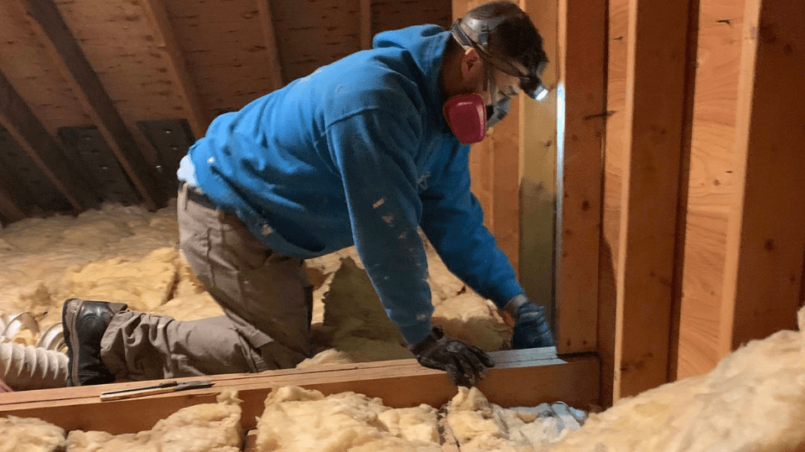Proper insulation is key to maintaining a comfortable, energy-efficient home. Residential insulation contractors specialize in installing and upgrading insulation in homes, helping homeowners reduce energy costs, improve indoor comfort, and lower their environmental impact. Whether you’re building a new home or upgrading an older one, choosing the right insulation contractor ensures that your home stays well-insulated and protected from extreme temperatures year-round.
Why Insulation Matters for Your Home
1. Energy Efficiency and Cost Savings
Insulation acts as a barrier between the interior of your home and the outside environment, preventing heat from escaping in the winter and keeping your home cool in the summer. Properly installed insulation helps to reduce the workload on your heating and cooling systems, leading to lower energy bills and increased energy efficiency.
2. Enhanced Indoor Comfort
Good insulation maintains consistent indoor temperatures, reducing drafts, cold spots, and temperature fluctuations. With adequate insulation, your home remains comfortable year-round, regardless of the weather outside.
3. Noise Reduction
Insulation doesn’t just regulate temperature—it also acts as a sound barrier. Installing insulation in walls, floors, and ceilings can reduce noise from outside, as well as noise between rooms, creating a quieter and more peaceful living environment.
4. Environmental Benefits
By improving your home’s energy efficiency, insulation reduces your carbon footprint. Using less energy to heat and cool your home contributes to lower greenhouse gas emissions, making insulation an environmentally friendly choice.
Types of Residential Insulation
Residential insulation contractors offer a variety of insulation types, each with its own benefits and uses. Here are the most common types of insulation for homes:
1. Fiberglass Insulation
Fiberglass insulation is one of the most common types of insulation used in residential homes. It consists of fine glass fibers that trap air, providing thermal resistance. Fiberglass insulation is available in batts, rolls, or loose-fill form and is typically installed in walls, attics, and crawl spaces.
2. Spray Foam Insulation
Spray foam insulation expands upon application, filling gaps and cracks in walls, ceilings, and other spaces. It provides superior thermal performance and creates an airtight seal, reducing air leaks. Spray foam insulation is ideal for hard-to-reach areas and for homes with irregularly shaped spaces.
3. Cellulose Insulation
Cellulose insulation is made from recycled paper products and treated with fire retardants. It is an eco-friendly option that provides excellent thermal resistance and soundproofing. Cellulose insulation is commonly used in attics and walls and is applied using a blowing machine.
4. Rigid Foam Insulation
Rigid foam insulation panels provide high thermal resistance and are commonly used in foundations, basements, and exterior walls. Rigid foam is moisture-resistant, making it ideal for areas prone to dampness or humidity.
5. Reflective or Radiant Barrier Insulation
Reflective or radiant barrier insulation is typically installed in attics and works by reflecting heat away from your home. It is particularly effective in hot climates, where reducing radiant heat can significantly lower cooling costs.
Choosing the Right Residential Insulation Contractor
Selecting the right contractor is essential to ensuring that your home’s insulation is installed correctly and efficiently. Here are key factors to consider when choosing a residential insulation contractor:
1. Experience and Expertise
Look for a contractor with extensive experience in residential insulation. An experienced contractor will understand the nuances of different insulation materials and know how to properly install them to maximize energy efficiency. Ask about their previous projects and whether they have experience with homes similar to yours.
2. Licensing and Certifications
Ensure the contractor is licensed and certified to work in your area. Certifications from organizations like the Building Performance Institute (BPI) or Insulation Contractors Association of America (ICAA) indicate that the contractor has received proper training and adheres to industry standards.
3. Comprehensive Home Assessment
A reputable insulation contractor should conduct a thorough home assessment before providing recommendations. This assessment should include evaluating your home’s existing insulation, checking for air leaks, and identifying areas where insulation is needed. A contractor who takes the time to assess your home’s specific needs will be better equipped to provide an effective solution.
4. Transparent Pricing and Estimates
Request a detailed estimate that outlines the cost of materials, labor, and any additional services. The contractor should provide transparent pricing and be willing to explain any potential additional costs. Be cautious of estimates that seem significantly lower than others, as this could indicate subpar materials or workmanship.
5. Warranty and Guarantee
Choose a contractor who offers a warranty on both the materials and the workmanship. A strong warranty ensures that the contractor will address any issues that arise after installation, giving you peace of mind that your investment is protected.
The Insulation Installation Process
1. Consultation and Assessment
The process begins with an initial consultation where the contractor will assess your home’s insulation needs. This includes evaluating current insulation levels, identifying areas that require improvement, and recommending the best insulation materials for your home.
2. Preparation
Before installation, the contractor will prepare the area by sealing any air leaks, removing old or damaged insulation, and ensuring that the space is clean and ready for the new insulation.
3. Insulation Installation
Depending on the type of insulation chosen, the contractor will install the insulation in the designated areas of your home, such as the attic, walls, crawl spaces, or basement. This may involve placing batts or rolls of fiberglass, spraying foam, or blowing in loose-fill insulation.
4. Final Inspection
After the installation is complete, the contractor will conduct a final inspection to ensure that the insulation has been properly installed and that all gaps or voids have been filled. They may also perform tests to check for air leaks or energy efficiency improvements.
5. Post-Installation Review
The contractor should provide you with a post-installation review, explaining the improvements made and offering tips for maintaining your home’s insulation. They may also suggest additional measures to enhance energy efficiency, such as sealing windows and doors or upgrading your HVAC system.
Conclusion
Residential insulation contractors play a crucial role in improving your home’s comfort, energy efficiency, and overall value. By choosing the right insulation and having it installed by experienced professionals, you can significantly reduce your energy costs and create a more comfortable living environment. Whether you’re building a new home or upgrading an existing one, working with a qualified insulation contractor ensures that your home is well-insulated and protected for years to come.








